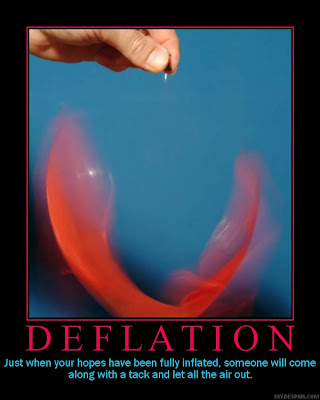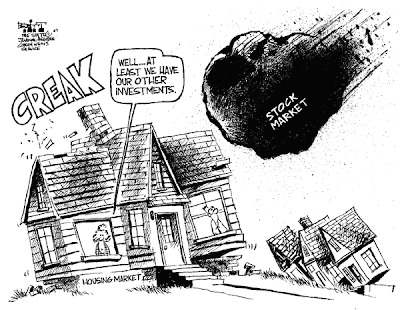Here’s another article on China, courtesy of Mish. 
Peter Schiff Hugely Right, Enormously Wrong as Hard Landing Hits China
We will take a look at Schiff from two perspectives shortly. First let’s note the massive influx of workers into Chinese cities is now in reverse as Chinese job losses prompt exodus.
Tens of thousands of migrant workers are leaving the southern Chinese city of Guangzhou after losing their jobs, railway officials say. The increase to 130,000 passengers leaving the city’s main station daily is being blamed on the credit crunch.
Guangzhou is one of China’s largest manufacturing hubs, but many companies who export products have collapsed. Chinese officials are worried that a sudden increase in unemployment could lead to social unrest.
The most badly hit export companies are toy, shoe, and furniture manufacturers. There are already reports of demonstrations and social unrest in the provinces of Zhejiang and Guangdong.
Toy Manufacturing Collapses
Here are a few headlines about the Chinese to exporting business.
Half of China’s toy exporters out of business
A total of 3,631 toy exporters or 52.7 percent of the industry’s businesses shut down in 2008. They were mainly small-sized toy producers with an export value of less than $100,000.
Thousands of toy makers laid off
Workers at a toy factory in Guangdong have become the latest victims of the worldwide financial tsunami.
More than 6,000 employees lost their jobs when Smart Union, a major toy manufacturer in Dongguan, closed earlier this week. "The main reason for the closure is we are too dependent on the US market, which has become sluggish," said Xu Xiaofang, a Smart Union human resource worker.
After losing money for the first half of the year, its cash flow finally dried up.
Machinery normally busy churning out toys for major US toy brands Mattel and Disney now sits idle.
50% of toy firms ‘gone in 2 years’
Speaking in an interview with Guangzhou Daily, Wang Zhiguang, vice-chairman of the Dongguan Toy Industry Association, said: "Of the 3,800-odd toy firms in Dongguan, no more than 2,000 are likely to survive the next couple of years."
Xiao Yong, the owner of a Dongguan firm that sells Christmas trees and gifts, is equally worried about what the coming winter might have in store.
"One of the main problems is that many toymakers in Dongguan rely too much on orders from the US and Europe. The financial crises there have led directly to a reduction in orders," he said. The number of orders his firm has received for this Christmas is about half what it reported last year, he said.
Sub-contract factories fall victim to US crisis
Two sub-contract manufacturing factories under one global toy maker in South China’s Guangdong Province have collapsed, in the first bankruptcy case for the substantial economy in China, according to today’s National Business Daily.
The two factories, located in Zhangmutou Town of Dongguan City, were toymakers for Smart Union Group (Holding) Ltd, one of the world’s largest manufacturing and trading companies in toys and recreational products on an original equipment manufacturer basis. All the products were being sold to the United States.
Home Prices Collapse In China
As the Chinese economy skids and jobs are lost, home prices collapse. USA Today picks up the story in Economy rocks China factories
The speedy rise — and speedier fall — of River Dragon is a depressingly familiar story in China these days. Thousands of Chinese factories have shuttered in the past year, done in by:
•An export-killing global slowdown that began with the collapse of the U.S. housing market and the ensuing financial crisis.
•Rising materials costs that have squeezed profit margins.
•A deliberate Chinese government campaign to regulate sweatshop factories out of business.
The Chinese economy is absorbing another blow beyond crumbling exports: collapsing home prices. Nicholas Lardy, senior fellow at the Peterson Institute for International Economics in Washington, D.C., reckons a slowdown in construction could shave another 1 to 2 percentage points off China’s economic growth.
"The property bubble is already starting to burst," says Yan Yu, a business management scholar at Peking University, researching the export center of Dongguan in southern Guangdong province. "House prices here in Dongguan have fallen by up to 50% this year," leaving many homeowners owing more on their mortgages than their homes are worth.
"People have worked all their lives and believed the hype and bought overvalued properties, then saw their savings vanish," says independent economist Andy Xie in Shanghai. "That carries more political risk" than rising joblessness.
China Announces Major Stimulus Plan
The Wall Street Journal is reporting China Announces Major Stimulus Plan.
China announced a stimulus program that could exceed half a trillion dollars, its biggest move yet to rebuild rapidly weakening confidence and unleash domestic demand to counter the prospect of global economic recession.
The package of infrastructure investment and other stimulus measures is to be spread over the next two years and appears to include some measures that were already announced. Still, the huge scale of the planned response — potentially 4 trillion yuan ($586 billion) — underscores how rapidly the outlook for China’s once-booming economy has worsened and how the country remains comparatively well-placed to deal with such a slowdown.
Other governments around the world are also considering fiscal stimulus plans to boost their economies, something the International Monetary Fund has encouraged. U.S. lawmakers, during their lame-duck session next week, are expected to consider a stimulus package focused on aid to local governments and extended unemployment benefits.
U.S. House Speaker Nancy Pelosi is pushing for a two-step plan with as much as $100 billion this month followed by a companion measure early next year that would include a tax cut. Outside economists are urging Democratic congressional leaders to move a much larger package — as much as $300 billion, or 2% of U.S. economic output — as the U.S. economy faces one of its worst recessions since the 1930s.
China’s plan appears to be comparable in size. In a statement announcing the plan, China’s State Council said it would deliver 120 billion yuan ($18 billion) of new spending in the last quarter of this year alone. The State Council — effectively China’s cabinet — estimated that would drive an additional increase of 400 billion yuan in local and private-sector investment throughout the economy.
China’s government is also making plans for new spending in areas such as low-cost housing, road and rail infrastructure, agricultural subsidies, health care and social welfare over the next two years.
Peter Schiff – Hugely Right, Enormously Wrong
Summit Of Winners
In the video, Peter Schiff rants and raves about clueless economists and more spending and fiscal stimulus and states "We need that like a hole in the head". And on that point he is entirely correct.
I totally agree with Schiff. The cause of the economic crisis we are in now is a result of reckless spending and loose monetary policy. If reckless spending was the cause of this mess then reckless spending cannot be the cure.
On that basis I nominated Schiff for my "Summit Of Winners". See Bush to Host Summit of Losers for more details.
Decoupling Missed
After that initial opening, Schiff jumps off the deep end with a "print print print" rant about hyperinflation, a huge rant against Obama, talk of recovery in his funds, and finishing up with "There is no way the dollar can possibly survive what is coming".
The big thing Schiff missed this year was in his decoupling theories. Schiff invested as if the US would crash and that everything else would be fine. The decoupling theory never made much sense. To believe in decoupling is to believe the tail wags the dog. And instead of saying how much his fund is up off the lows, he ought to disclose precisely how his anti-dollar fund plays are doing this year.
What happened was that although the US stock market collapsed, China, India, Iceland, Japan, the UK, and numerous other places collapsed more. So when the dollar rallied on top of that, investments in those places got mercilessly hammered.
Too Anti-Dollar Focused
Even though the US dollar index fell from 120 to 70, Schiff was still looking for a collapse of the dollar. It had already collapsed.
Schiff ignores monetary printing in China, huge bank bailouts in Europe, housing bubbles in Australia, Canada, Spain, and the UK, all bigger than in the US. The stock market bubbles outside the US were even bigger than the stock market bubble here.
Furthermore, there has been more monetary printing in China this year than in the US. And as noted above China just announced the same reckless measures the US did in trying to stimulate the economy.
The UK and ECB are doing the same thing (bailing out banks), and the UK is arguably in much worse shape than the US overall.
Finally, there were many signs the US dollar were going to rally and those signs were pointed out in real time on this blog.
- August 8 : Trichet Puts Spotlight on the Euro, Dollar
- August 9 : Marc Faber – Bullish On The US$, Bearish On Commodities
- August 11 : Currency Intervention And Other Conspiracies
- August 18 : Steve Saville On The US Dollar And Gold
- September 4 : Telling Action In Euro, Dollar As ECB Holds Rates
- September 15 : US Dollar Rally Not Over Yet
- October 2 : U.S. Dollar Bulls Still Right, Here’s Why
For the record, I am now neutral on the US dollar as the US dollar index came close to hitting my target.
Escalating Inflationary Pressures
Currency Intervention Won’t Halt the U.S. Dollar’s Nosedive
Tuesday, July 1st, 2008
By Peter D. SchiffLast week the U.S. Federal Reserve moved one step closer to acknowledging reality.
Unfortunately, it didn’t let that admission move it from a policy course firmly guided by fantasy – meaning the central bank opted to stand pat on interest rates, despite the clear escalation of inflationary pressures. …
Deflationary pressures have never been greater in the US, UK, EU, Canada, Australia, and other countries. Collapsing debt bubbles, rising foreclosures, rising defaults, and rising unemployment are deflationary forces. And those forces are global, not just in the US.
Yes, the US is going to print but so is everyone else. In isolation, what looks awful for the US, does not look so awful in relation to what every other country is doing.
This should be a good backdrop for gold and that is another point on which I agree with Schiff. Intermediate term, we could both be wrong.
And while there will be printing under Obama (by the Fed), at least that printing is likely to go for something. Money spent on infrastructure is far more dollar friendly than money used to blow up Iraq. There is also a chance that Democrats and Obama slash military spending, and if they do, it will be a dollar friendly thing.
I am not here to defend spending programs for the simply reason I do not agree with them. I happen to agree with Schiff. My disagreement is what the net result will be. Japan spent like mad and the Yen still rose. If the rest of the world spends like the US does, it is certainly possible the dollar keeps rising as well. What’s arguably more likely is that the dollar stabilizes within a broad range.
One thing that is for certain is that nearly everyone, especially Schiff, failed to see the deflation we are now in. And rest assured it is deflation that central bankers across the globe are fighting.
Schiff needs to get off his anti-Obama, anti-dollar mindset and take a look at the global economy and problems elsewhere, especially in China, the UK, and the Eurozone. That video proves he is not capable of doing so. It equally proves he does not fully understand the deflationary forces of Peak Credit and the global debt unwind that are happening. For a previous debate with Schiff please see Not Your Father’s Deflation: Rebuttal and Peter Schiff Replies to Deflation Rebuttal.
Looking ahead, it is quite possible that if all pegs were removed and the Renmimbi allowed to freely float, that the Renmimbi, not the US dollar would crash. Certainly the pound could crash (I think that is likely), and the EU might even break up.
The tremendous irony is that I happen to agree with much what he said in the video. I certainly am not bullish on US equities, nor am I in favor of the programs that are likely to come out of Congress. However, when it comes to global conclusions and the US dollar, I think it’s a case of Hugely Right, Enormously Wrong, at least over the intermediate timeframe. After the debt bubble unwinds, then and only then will inflation become the primary threat.





